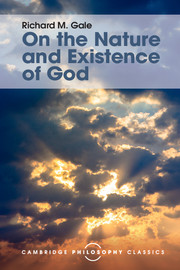Book contents
- Frontmatter
- Dedication
- Contents
- Preface to this edition
- Acknowledgments
- Introduction
- Atheological arguments
- 1 Atheology and the nature of God
- 2 The creation–immutability argument
- 3 The omniscience–immutability argument
- 4 The deductive argument from evil
- 5 The argument from world-relative actuality
- Theological arguments
- Index
4 - The deductive argument from evil
from Atheological arguments
Published online by Cambridge University Press: 05 July 2016
- Frontmatter
- Dedication
- Contents
- Preface to this edition
- Acknowledgments
- Introduction
- Atheological arguments
- 1 Atheology and the nature of God
- 2 The creation–immutability argument
- 3 The omniscience–immutability argument
- 4 The deductive argument from evil
- 5 The argument from world-relative actuality
- Theological arguments
- Index
Summary
The existence of evil poses both a logical and empirical problem for theism, forming the basis of both a deductive argument that attempts to deduce a contradiction from the existence of both God and evil and an inductive argument that contends that it is improbable that God is the creator of a world that contains the amount and kinds of evils found in this one. Since the deductive argument tries to prove that there is no possible world that contains both God and evil, all the theist need do to rebut it is to show that it is logically possible that God and evil coexist, and this can best, maybe only, be done by actually describing a possible world in which both exist. In such a world God will have a good reason or morally exonerating excuse for permitting evil. Such a response constitutes a defense. To rebut the inductive argument, the theist must construct a theodicy, which is a defense plus an empirical argument for the actual existence of the possible world articulated in the defense.
Often a defense is confounded with a theodicy, resulting in the bogus demand that the theist produce a theodicy as a rebuttal of the deductive argument. H. J. McCloskey, as an example, first espouses the deductive argument. “Evil is a problem for the theist,” he says, “in that a contradiction is involved in the fact of evil on the one hand, and the belief in the omnipotence and perfection of God on the other.” He shows a surprisingly short memory span because later in his essay he says of a certain defense that “it does not in itself provide a justification for the evil in the universe. It shows simply that the evil which occurs might have a justification.” And when he discusses the free will defense (hereafter FWD), he says that it “can at best show that moral evil may have a justification, and not that it has a justification.” These admissions are inconsistent with his earlier claim that theism is inconsistent in holding that both God and evil exist. He seems to be requiring of an adequate defense that it also succeed as a theodicy, which belies a serious conceptual confusion on his part. It is desirable, of course, that a successful defense have the makings of a plausible theodicy, but this is not logically required.
- Type
- Chapter
- Information
- On the Nature and Existence of God , pp. 82 - 151Publisher: Cambridge University PressPrint publication year: 2016

